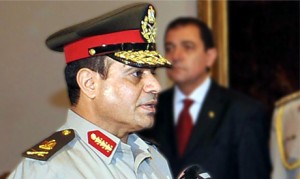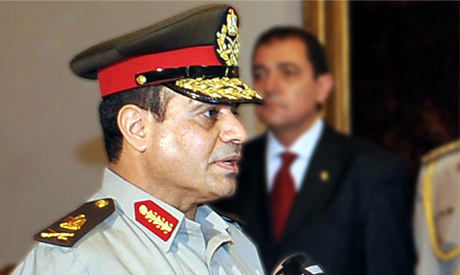
Photo: Abdel Fatah El-Sisi, Minister of Defence
(AFP/Photo)
Minister of Defence General Abdel Fatah Al-Sisi denied any knowledge of how top secret State Security documents came to be destroyed in a court testimony on Tuesday.
Cairo Criminal Court summoned the armed forces Commander-in-Chief who was Director of Military Intelligence and Reconnaissance, when activists stormed State Security Investigations Service headquarters nationwide in February 2011.
Former State Security Director Hassan Abdel Rahman and 40 other top officials in the service are facing trial under charges of destroying important official documents.
Activists and protesters stormed State Security Investigations Service headquarters nationwide in February 2011, only to find most documents housed inside shredded or otherwise destroyed.
Al-Sisi’s testimony was intended to be confidential and the court banned journalists from the session, but the information was leaked to several newspapers including state-owned Al-Ahram.
The defence minister said the military only found out activists intended to storm State Security headquarters from the internet and that military intelligence had no prior information regarding the incident.
“The armed forces were deployed on 28 January 2011 to protect the country until 20 June 2012. Towards the end of February 2011 there were rumours that the revolutionaries intended to storm State Security headquarters so the Prosecutor General asked the military to protect the offices due to their housing of important and life threatening documents,” Al-Sisi told the judge.
He added that military personnel stood guard on the outside but did not enter any State Security buildings. Al-Sisi said troops were ordered not to shoot on protesters even if they stormed the building.
After the court finished questioning Al-Sisi it opened the floor to civil claimant lawyers who asked several questions of their own.
“State agencies do not investigate each other and each agency is tasked with protecting its own secret documents,” Al-Sisi said, when asked if Military Intelligence had investigated the storming of State Security buildings.
When asked why State Security officials would shred the service’s documents in bulk, Al-Sisi said he did not specifically know why. “The agency was protecting secrets which could be problematic if revealed to the public, taking into consideration the state of the country at the time,” he said.
As for why the Supreme Council of the Armed Forces, ruling the country at the time, did not protect State Security officers, Al-Sisi said the priority at the time was not to clash with civilians, and that that priority came above all other considerations.
The court objected to one lawyer’s question regarding whether or not the prime minister at the time, later presidential candidate Ahmed Shafiq, had any knowledge of the document shredding.
It also refused a question on how State Security files were leaked to the public in the aftermath of the incident.
Al-Sisi told lawyers the information housed inside State Security offices was related to national security and that the military had not taken control of the offices following the storming.
The court adjourned the case to Wednesday’s session, when it is scheduled to hear arguments from the State Litigation Authority and civil claimants.
The trial was held in the police academy in New Cairo, which saw extra security procedures in a joint effort between the police and military police ahead of Al-Sisi’s arrival.
